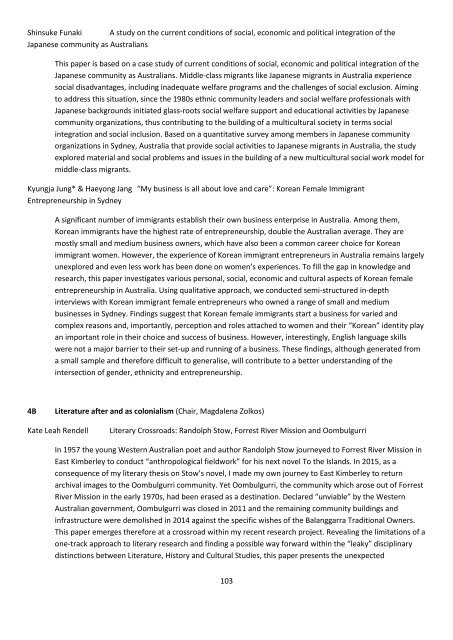Crossroads in Cultural Studies Conference 14-17th December 2016 Program Index
Crossroads-2016-final-draft-program-30-Nov
Crossroads-2016-final-draft-program-30-Nov
You also want an ePaper? Increase the reach of your titles
YUMPU automatically turns print PDFs into web optimized ePapers that Google loves.
Sh<strong>in</strong>suke Funaki A study on the current conditions of social, economic and political <strong>in</strong>tegration of the<br />
Japanese community as Australians<br />
This paper is based on a case study of current conditions of social, economic and political <strong>in</strong>tegration of the<br />
Japanese community as Australians. Middle-class migrants like Japanese migrants <strong>in</strong> Australia experience<br />
social disadvantages, <strong>in</strong>clud<strong>in</strong>g <strong>in</strong>adequate welfare programs and the challenges of social exclusion. Aim<strong>in</strong>g<br />
to address this situation, s<strong>in</strong>ce the 1980s ethnic community leaders and social welfare professionals with<br />
Japanese backgrounds <strong>in</strong>itiated glass-roots social welfare support and educational activities by Japanese<br />
community organizations, thus contribut<strong>in</strong>g to the build<strong>in</strong>g of a multicultural society <strong>in</strong> terms social<br />
<strong>in</strong>tegration and social <strong>in</strong>clusion. Based on a quantitative survey among members <strong>in</strong> Japanese community<br />
organizations <strong>in</strong> Sydney, Australia that provide social activities to Japanese migrants <strong>in</strong> Australia, the study<br />
explored material and social problems and issues <strong>in</strong> the build<strong>in</strong>g of a new multicultural social work model for<br />
middle-class migrants.<br />
Kyungja Jung* & Haeyong Jang “My bus<strong>in</strong>ess is all about love and care”: Korean Female Immigrant<br />
Entrepreneurship <strong>in</strong> Sydney<br />
A significant number of immigrants establish their own bus<strong>in</strong>ess enterprise <strong>in</strong> Australia. Among them,<br />
Korean immigrants have the highest rate of entrepreneurship, double the Australian average. They are<br />
mostly small and medium bus<strong>in</strong>ess owners, which have also been a common career choice for Korean<br />
immigrant women. However, the experience of Korean immigrant entrepreneurs <strong>in</strong> Australia rema<strong>in</strong>s largely<br />
unexplored and even less work has been done on women’s experiences. To fill the gap <strong>in</strong> knowledge and<br />
research, this paper <strong>in</strong>vestigates various personal, social, economic and cultural aspects of Korean female<br />
entrepreneurship <strong>in</strong> Australia. Us<strong>in</strong>g qualitative approach, we conducted semi-structured <strong>in</strong>-depth<br />
<strong>in</strong>terviews with Korean immigrant female entrepreneurs who owned a range of small and medium<br />
bus<strong>in</strong>esses <strong>in</strong> Sydney. F<strong>in</strong>d<strong>in</strong>gs suggest that Korean female immigrants start a bus<strong>in</strong>ess for varied and<br />
complex reasons and, importantly, perception and roles attached to women and their “Korean” identity play<br />
an important role <strong>in</strong> their choice and success of bus<strong>in</strong>ess. However, <strong>in</strong>terest<strong>in</strong>gly, English language skills<br />
were not a major barrier to their set-up and runn<strong>in</strong>g of a bus<strong>in</strong>ess. These f<strong>in</strong>d<strong>in</strong>gs, although generated from<br />
a small sample and therefore difficult to generalise, will contribute to a better understand<strong>in</strong>g of the<br />
<strong>in</strong>tersection of gender, ethnicity and entrepreneurship.<br />
4B<br />
Literature after and as colonialism (Chair, Magdalena Zolkos)<br />
Kate Leah Rendell<br />
Literary <strong>Crossroads</strong>: Randolph Stow, Forrest River Mission and Oombulgurri<br />
In 1957 the young Western Australian poet and author Randolph Stow journeyed to Forrest River Mission <strong>in</strong><br />
East Kimberley to conduct “anthropological fieldwork” for his next novel To the Islands. In 2015, as a<br />
consequence of my literary thesis on Stow’s novel, I made my own journey to East Kimberley to return<br />
archival images to the Oombulgurri community. Yet Oombulgurri, the community which arose out of Forrest<br />
River Mission <strong>in</strong> the early 1970s, had been erased as a dest<strong>in</strong>ation. Declared “unviable” by the Western<br />
Australian government, Oombulgurri was closed <strong>in</strong> 2011 and the rema<strong>in</strong><strong>in</strong>g community build<strong>in</strong>gs and<br />
<strong>in</strong>frastructure were demolished <strong>in</strong> 20<strong>14</strong> aga<strong>in</strong>st the specific wishes of the Balanggarra Traditional Owners.<br />
This paper emerges therefore at a crossroad with<strong>in</strong> my recent research project. Reveal<strong>in</strong>g the limitations of a<br />
one-track approach to literary research and f<strong>in</strong>d<strong>in</strong>g a possible way forward with<strong>in</strong> the “leaky” discipl<strong>in</strong>ary<br />
dist<strong>in</strong>ctions between Literature, History and <strong>Cultural</strong> <strong>Studies</strong>, this paper presents the unexpected<br />
103


